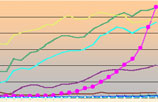Abe's Washington trip is a test of his attitude toward history
(China Daily) Updated: 2015-04-27 07:59
 |
|
President Barack Obama shakes hands with Japanese Prime Minister Shinzo Abe as they arrive to participate in a bilateral meeting at the Akasaka State Guest House in Tokyo. [Photo/IC] |
Japanese prime minister Shinzo Abe started his official visit to the United States on Sunday. During his trip he is due to deliver a speech in the US Congress. The world is waiting to hear what he has to say about Japan's aggression before and during World War II, especially as he recently said he wouldn't repeat wordings like "apology" and "aggression" in his address planned for the 70th anniversary of the end of WWII. Comments:
(We) fervently hope Prime Minister Abe will take advantage of this auspicious milestone during his visit to Washington to enhance Japan's relationships with its neighbors through a vision of long overdue healing and reconciliation which will contribute to future-oriented cooperation.
25 US lawmakers, headed by Mike Honda, in a co-signed letter to the Japanese Ambassador to the US, Kenichiro Sasae, April 23
Abe has publicly expressed remorse for the war and said he will honor Japan's past apologies for its aggression, including the sex slavery. Yet he has added vague qualifiers to his comments, creating suspicions that he doesn't take the apologies seriously and will try to water them down. His government has compounded the problem by trying to whitewash that history. By now, that history should have been settled, that it is not settled is largely the fault of Mr Abe and his right-wing political allies who keep questioning history and even trying to rewrite it, stoking regional tensions.
New York Times, April 20
No matter how horrible or painful a country's history is, we must learn from it and not run from it; I truly hope that Abe will not give us a vague comment about World War II ... Those who were responsible are dead, but denying the truth only gives them 'life' to distort and continue the hurt and anger.
Jan Thompson, president of the American Defenders of Bataan and Corregidor (ADBC) Memorial Society, which represents surviving US prisoners of the Japanese, April 24
It is very possible that Abe will use the tour as an opportunity to defend his wordings on history. However, the US might exert pressure and push him not to distort history, because that move will cause tensions between Japan and its Asian neighbors, which in turn will hurt the US' alliance system and interests in Asia. As the main builder and leader of post-war world order, the US won't tolerate Japanese politician's vagueness on history.
Guo Xiangang, a senior researcher at and deputy dean of the China Institute of International Relations, April 24
Prime Minister Shinzo Abe once observed that "a foundation for the future cannot be something severed from the past". He should never forget that these words came from his own mouth.
AsashiShimbun (Japanese Newspaper), April 23











